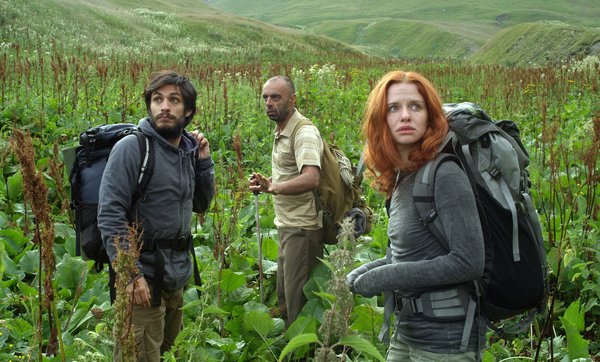|
'The Loneliest Planet' is a revealing journey
Posted on: 10/28/12
Gael Garcia Bernal and Hani Furstenberg star as backpacking couple whose relationship is tested in Julia Loktev's intimate and beautiful film. In "The Loneliest Planet," the faces and bodies of the adventurous couple at the center of the film's journey do most of the talking, and pretty eloquently I might add. So driven is filmmaker Julia Loktev to immerse us in the couple's existential experience that dialogue is nearly nonexistent and stars Gael Garcia Bernal and Hani Furstenberg are often little more than specks on the horizon. It's as if Strasberg's Method acting techniques — that focused approach to "become" someone else, all baggage explored and absorbed by the actor — has been adopted by the director. The movie opens with Nica (Furstenberg) naked, covered in soap, jumping up and down to keep from freezing, as Alex (Bernal) pours hot water over her, pitcher by pitcher. The setting is rustic, crowded with a chattering family speaking in a language Alex and Nica clearly don't understand. Like the couple, we are left in the dark. We can tell they are safe, and that they are very much in love — a tenderness in even the most casual touch, as if reassuring themselves that what they have is real. Through a string of similar small, telling moments — intimate, personal, ordinary — the story comes together. We've caught Alex and Nica a few weeks before their wedding as they backpack across the Caucasus Mountains. A bit of street bartering connects them with a local guide named Dato (Bidzina Gujabidze, in real life a top-ranked Georgian mountaineer). The sureness in Dato's step as he moves along ribbon-thin mountain trails, or fords streams churned rough by rapids, even his patience in waiting out a rainstorm, all form a kind of ballast for the sometimes euphoric, sometimes rocky emotional terrain. Alex and Nica's shifting feelings about themselves and each other form the heart of the screenplay, which Loktev adapted from a Tom Bissell short story and her own experience of backpacking the region with a boyfriend, now an ex. The travel itself becomes a crucible for the couple; the very unpredictable nature of such journeys stress-testing for cracks. Within all the silence, and despite Loktev's often-distant lens, there is a complex conversation going on between Alex and Nica. The vagaries of relationship dynamics in a feminist world and the notion of what it means to be a man in these modern times are examined. As circumstances ripple through the lovers' emotions, there are discoveries about each other that are not easy to get past. When the turning point comes, the silence becomes even deeper. Most of it is written on Nica's agonized face and in Alex's slumped shoulders, a vulnerability that speaks volumes. The question that hangs in the air is not only if, but how, the relationship will weather the storm. Shot on location by cinematographer Inti Briones, "Planet" is a piece of art even without Bernal and Furstenberg, who are like moving portraits of themselves in this film. The landscape is breathtaking, pristine mountains that dwarf the trekkers. Sometimes the screen is literally filled by the massive green monoliths, awash in sunlight, drenched in shadows. Sheep and gnarled shepherds move across meadows scattered by wildflowers. Crumbling remnants of villages occasionally interrupt all this excess of the natural world, echoes of other lives. Stylistically, the film continues the voyeuristic sensibility Loktev brought to her first feature, 2006's "Day Night Day Night." Though she takes her time in "Planet," there is more attention to the pacing, significant when the structure is so vaporous. Bernal and Furstenberg exist within this meditative space with all the ease and unease of a couple still trying each other on for size. The forces that push and pull them feel so rooted in reality that if not for the layers of meaning it might seem a complete improvisation. Both are beautiful to watch in unconventional and interesting ways that the camera takes full advantage of. There are a few things that disrupt the peace in "The Loneliest Planet." The plot twists that put their moral fiber to the test are nicely nuanced. But Richard Skelton's haunting score is peripatetic — sneaking in with great subtlety, only to drop away suddenly, momentarily pulling you out of the film. But it's a minor quibble, for this journey of two lovers is well worth taking COMMENTS
Be the first to post a comment! Post A Comment:

|
.gif)



.jpg)

